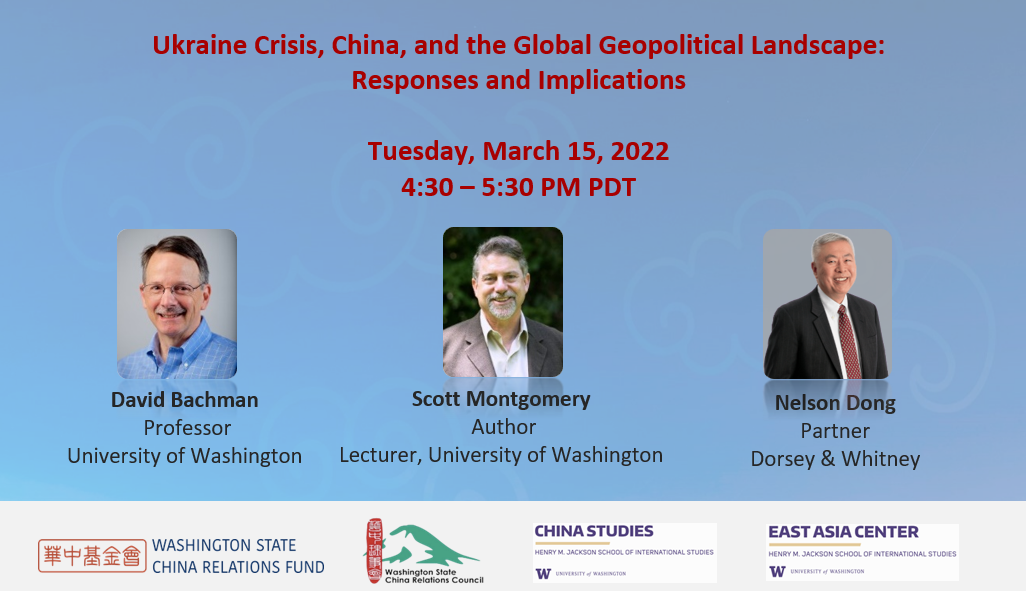
Ukraine Crisis, China, and the Global Geopolitical Landscape: Responses and Implications
Russia’s brutal invasion of Ukraine is creating new uncertainties in the global geopolitical and geo-economic landscape. At first glance, the crisis seems mainly European in nature, involving the European Union (EU) and NATO with regard to Ukraine and Russia, but another critical stakeholder is China. President Xi welcomed President Putin to the recent Winter Olympic Games in Beijing and has just pronounced that Russia will be China’s greatest strategic partner with an ironclad Sino-Russian relationship. At the same time, China abstained from (and did not veto) a recent UN Security Council resolution to condemn Russia’s invasion. This unprecedented crisis poses many novel questions:
• Will China’s renewed partnership with Russia—one that has, according to both sides in early February, “no limits”—be tested by the invasion? Or does it merely assure that Russia will be driven even further into China’s waiting and intentional embrace?
• What are the implications of China’s ambiguous public responses to the war in Ukraine thus far? Can (and will) China play a constructive role in resolving the crisis given its influence with Moscow?
• How will the deepening Sino-Russian trade relationship affect the economic sanctions imposed by the US, the EU and other like-minded countries?
• How might the crisis upend energy geopolitics between China and Russia and around the world ?
• What, if any implications, are there for Taiwan?
Please join our experts for a panel discussion on these and other important issues surrounding the crisis.
This event is produced by the Washington State China Relations Fund, a sister organization of the Washington State China Relations Council, and sponsored by the East Asia Center and the China Studies Program at the Henry M. Jackson School of International Studies, University of Washington.
PANELISTS

David Bachman is the Henry M. Jackson Professor of International Studies in the Jackson School of International Studies at the University of Washington. He has been a faculty member at UW since 1991, and taught at Stanford University and Princeton University prior to coming to the University of Washington. He received his Ph.D. from Stanford University. He is the author/editor of three books and more than 50 articles on Chinese politics, foreign policy,, political economy, and US-China relations. At the UW he teaches courses on Chinese Foreign Policy, US-China Relations, The Rise of Asia and the Making of the 21st Century.
He is a member of the National Committee on U.S.-China Relations. He was a term member of the Council on Foreign Relations and President of the Washington State China Relations Council in 2005. He has chaired the Fulbright Committee on Academic Exchanges with the PRC.

Scott Montgomery is an author, geoscientist, and affiliate faculty member in the Jackson School of International Studies, University of Washington. He writes and lectures on a wide variety of topics related to energy (geopolitics, technology, resources, climate change), American politics, intellectual history, language and communication, and the history of science.
He is a frequent contributor to online journals such as The Conversation, Forbes, and Fortune, and his articles and op-eds are regularly featured in many outlets, including Newsweek, Marketwatch, The Huffington Post, and UPI. He also gives public talks and serves on panels related to issues in global energy and their relation to political and economic trends and ideas of sustainability. For more than two decades, Montgomery worked as a geoscientist in the energy industry, writing over 100 scientific papers and 70 monographs on topics related to oil and gas, energy technology, and industry trends.
Montgomery is the author of 12 books, including, The Shape of the New: Four Big Ideas and How They Built the Modern World (Princeton, 2015), co-authored with Dan Chirot, which The New York Times selected as one of the 100 Most Notable Books of 2015.
He is currently pursuing several areas of research. These include the role of Enlightenment ideas in present-day American politics, as well as the future of petroleum and its role in geopolitics and climate change.
MODERATOR

Nelson Dong is a partner in the Seattle office of Dorsey & Whitney LLP and heads its National Security Law Group and is co-head of its Asia Group. He advises companies, professional societies, universities and research organizations on export controls, economic sanctions, national security and international trade and investment matters. He is an author and teacher on international technology law issues and has been an adjunct professor of international law at the Seattle University Law School and a guest lecturer at the University of Washington Law School.
Nelson was a White House Fellow and U.S. Department of Justice official in the Carter Administration responsible for international and national security matters regarding U.S. relations with the former Soviet Union, the People’s Republic of China and Iran, and he also served as a federal prosecutor in Boston. He has twice been appointed to the U.S. Commerce Department’s President’s Export Council Subcommittee on Export Administration, its highest industry advisory body on U.S. export control policy.
Nelson is an Adjunct Senior Fellow at the East-West Center in Honolulu, a d1irector of the National Committee on US-China Relations in New York City and the Washington State China Relations Council in Seattle, and an active member of the Council on Foreign Relations and the Committee of 100. Nelson is a graduate of Stanford University and the Yale Law School and has served as a trustee of Stanford University.
- Event Recording: https://youtu.be/XZZw0Z6ghyw